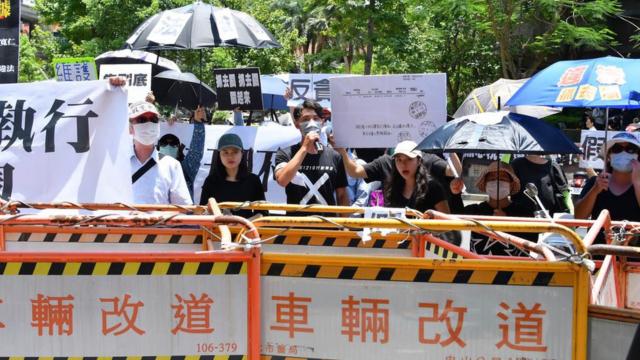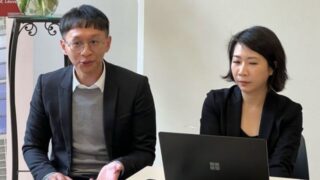The perseverance of Tai Ji Men in fighting for justice gives hope to all those who suffer throughout the world because their freedom of religion or belief is denied.
by Camelia Marin*
*Introduction to the the webinar “16th Anniversary of the Supreme Court Decision Recognizing the Tai Ji Men as Innocent,” co-organized by CESNUR and Human Rights Without Frontiers on July 13, 2023, 16th anniversary of the Supreme Court 2007 legal victory of Tai Ji Men.


After years of investigations and court trials, on July 13, 2007, the Supreme Court found Tai Ji Men not guilty of fraud, tax evasion, or violation of tax codes. Yet, the National Taxation Bureau continued to issue unjustified tax bills to Tai Ji Men and later even transferred the case to the Administrative Enforcement Agency. For years, Tai Ji Men’s properties and assets have been illegally frozen, and finally seized and auctioned. For years, several disciples (dizi) of Tai Ji Men have devoted themselves to show the truth and the innocence of their leader (Shifu) and their community.
On July 13, 2007, after the final review by the Supreme Court, the Tai Ji Men defendants were acquitted, and it was determined that they owed no taxes. In 2009, all defendants were awarded compensation for the previous wrongful imprisonment. Still, even after the Supreme Court decision, Dr Hong and his dizi continued to be harassed in Taiwan in several ways, particularly through ill-founded tax bills. What clearly appeared to be illegal tax bills were not corrected to zero. The case was listed by the Control Yuan as one of the major human rights violation cases in Taiwan’s recent history.
How the situation happened, and why it affected the lives of so many Tai Ji Men dizi? There are still several questions unanswered, and facts unexplained.
From our research, we can mention several causes, such as: the false accusations and the lack of interest for the truth, the non-respect of the principle of innocence, and the hostile climate created by systematically leaking biased information on the Tai Ji Men case to the media.
Throughout the world, fabricated cases against spiritual communities, such as Tai Ji Men, are often preceded and accompanied by aggressive media and public opinion campaigns aimed at denigrating the defendants and stigmatizing the groups they belong to. The Tai Ji Men case was presented in the media from a corrupt angle, misinforming and misleading the public opinion.
The right to a fair trial cannot be limited strictly to the area of the judiciary. The rule of law is challenged when the legal systems lack tools to hinder abuses and misinterpretations. In this case, the very institutions that should guarantee the rule of law are exposed to the risk of being misled by corruption.


The Tai Ji Men case shows evidence of multiple abuses. One aspect of disregarding the rule of law was that the decision of the Supreme Court was not applied, creating a case of administrative persecution or, we can say, corruption.
The Tai Ji Men case is not a domestic Taiwan tax law issue only. It is not a private problem of Dr. Hong. It is a case raising a question of principle, of justice, and of freedom of religion or belief.
The Tai Ji Men case is mostly a case of religious liberty. We all know that religious persecution and discrimination shaped by private financial interests and resulting in false charges have a long history.
The corruption and the biased application of the laws against religious and spiritual minorities have been systematically observed in the structures of different countries. The morality and ethics, which should be at the base of all natural and supportive structures of a country, are often disrespected and challenged by bureaucrats.
The highest courts and authorities of Taiwan had concluded that in the Tai Ji Men case there was no “cult,” no fraud, no violation of the Tax Collection Act. However the National Taxation Bureau insisted that the content of the “red envelopes” given by the Tai Ji Men dizi to their Shifu (Grand Master) should not be considered as a gift but as a tuition fee for receiving training in a so-called “cram school.” Why? Maybe a simple answer is that gifts are not taxable, while cram schools tuition fees are. Even after the National Taxation Bureau was compelled to reduce the tax bills for all the other years to zero, it used a technicality and maintained the bill for the year 1992—probably, for the same reason.


We can observe in several countries that the administrative power and particularly the tax agencies have the tendency to go beyond their boundaries and usurp functions of the judicial and legislative powers. Particularly when dealing with taxes, this normally creates risks for democracy and corruption.
Still, we should never forget that humanity has in itself higher ideals, and may respond positively to calls for morality, for awakening conscience, and for strong belief. We should all be grateful to Tai Ji Men dizi and to Dr. Hong for the perseverance and optimism that they demonstrate and share by standing for their case. They bring hope to many others around the world who have not found justice yet, but are still persecuted in violation of the universal human rights to freedom of thought, conscience, and belief.









